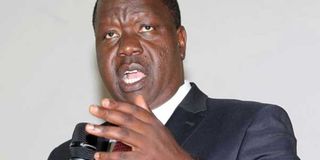Varsities stopped from hiring permanent lower-cadre staff

Education Cabinet Secretary Fred Matiang'i at a past event. He has directed public universities to stop hiring lower-cadre teaching and non-teaching staff on permanent basis. PHOTO | DENNIS ONSONGO | NATION MEDIA GROUP
What you need to know:
- The first phase was launched in February this year.
- The CS also lamented reported wastage of resources.
Universities will no longer hire lower-cadre teaching and non-teaching staff on permanent basis.
Education Cabinet Secretary Fred Matiang’i directed the institutions on Wednesday to also immediately do a staff audit to address growing wage bills.
At a meeting at Kenya School of Monetary Studies, Nairobi, to review growth of local public universities, he said only senior lecturers or higher will be permanent and pensionable.
TRIBALISM
The rot in the public universities — such as financial mismanagement, tribalism in recruitment and litigations engineered by top staff to lock out competitors — was also highlighted at the meeting.
“Time has come for us to look at what is going on in public universities,” said Dr Matiang’i at the launch of the second phase of reforms in public universities.
The first phase was launched in February this year.
Also in attendance was Head of Public Service Joseph Kinyua and the Secretary, State Corporation Advisory Committee, Ms Jane Mugambi, and senior Ministry of Education officers.
Dr Matiang’i also stopped the setting up of satellite campuses by universities.
“We have already closed campuses in Rwanda and Tanzania which were being run by Jomo Kenyatta University of Agriculture and Technology and Kenyatta University,” said Dr Matiang’i.
The CS said non-crucial university staff should be sacked, citing a university whose ratio of technical staff to non-teaching staff was 1:58.
PARALLEL
Technical University of Kenya, Technical University of Mombasa and Murang’a University were given six months to shed unnecessary staff inherited from previous institutions.
The meeting was told that universities run two payrolls, especially for teaching staff, who earned normal salaries and from parallel programmes.
“We must have a single payroll now with immediate effect,” said Dr Matiang’i.
The CS also lamented reported wastage of resources. He pledged to reform the recruitment of vice-chancellors, which has been characterised by court cases.
Mr Kinyua asked public universities to embrace public partnership in areas such as construction of hostels to avoid overreliance on the Exchequer.
PROPOSALS
He also cautioned against over-reliance on part-time lecturers, saying the institutions had enough lecturers, and cautioned against duplication of academic programmes ,while asking universities to specialise.
Ms Mugambi decried misappropriation of funds, narrating how senior managers had ganged up and developed special benefits for themselves.
She insisted that administrative staff, including VCs, must retire at 60.
“These are good proposals but we need time to look at them,” said Prof Francis Aduol, the Vice-Chancellors Committee chairman, however criticising the Commission for University Education for not addressing staff welfare and leaving the matter to the universities.





